Boys and girls behaving badly: Teachers, principals plea for help to improve student behaviour
WITH school results under the microscope, teachers say they are under siege in the classroom. Children have changed and growing young minds is taking a back seat to managing serious behaviour problems.
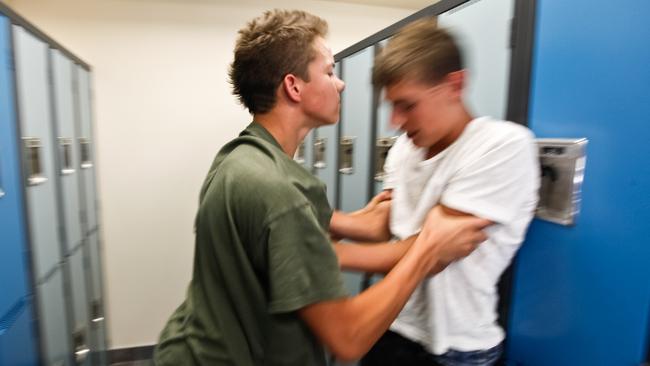
SA News
Don't miss out on the headlines from SA News. Followed categories will be added to My News.
- Class warfare: Students armed — SA school violence escalates
- Student assault on teachers more than doubles in three years
THERE was no one incident, no straw that broke the camel’s back, behind Melissa’s decision to quit the teaching profession at the end of first term this year.
But after eight years in the classroom, she knew she had to get out.
It was, rather, the cumulation of hundreds of incidents — many of them violent, many of them perpetrated by very young children — that led to her decision to leave her northern suburbs school.
It was the dwindling support for teachers at the coalface; the realisation the job was only going to get harder.
Above all, when the sparking of young minds was secondary to management of chronic behaviour problems, it was not the job she had signed up for.
“It got worse and worse. They came to school not ready to learn, so many social problems, so many language issues as well, not enough early intervention,” the 33-year-old says.
“My first year of teaching I got no teaching done, I had to keep evacuating the classroom because of violent incidents.
“These were Year 1 and 2 kids. They were throwing scissors, trashing the room.
“Teaching takes a back seat when you are dealing with those sorts of social issues on a daily basis.”
Her recollection may sound like the cliche of the downtrodden teacher in the downtrodden public school. But Melissa taught in a Catholic school.
“(There was) less and less support, less funding. I was getting more and more anxiety about going to school each day,” she says.
“They need more classroom support and behaviour experts in schools, child psychologists. They cost money and the system doesn’t have any money.”
Melissa spoke to the Sunday Mail in the wake of this year’s NAPLAN literacy and numeracy test results.
South Australia scored below national averages in every category. And in raw test scores, SA was the worst-performing mainland state in 16 of 20 categories.
The value of the testing system and the interpretation of the results are always hotly contested, but teachers and principals say SA’s scores are no surprise when so much time and effort is expended on behaviour management.
Other states, of course, have their share of difficult children, and the SA Government argues academic indicators such as NAPLAN are largely the product of demographics.
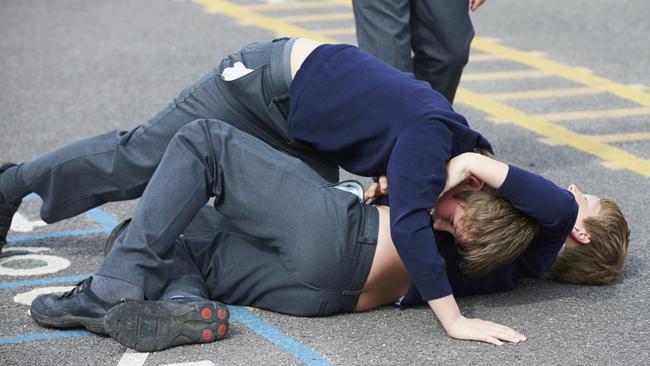
But local education leaders say better behaviour management strategies — a much bigger focus on the issue in the training of student teachers, including forcing them to spend time in the toughest schools; more dedicated behaviour centres; and more classroom support for teachers — could be a key to closing the achievement gap. And to retaining teachers like Melissa.
The fact that Melissa’s story is hardly an isolated case is demonstrated by her experience finding a new job as a local council library co-ordinator. She was told that 300 people applied for the position — most of them teachers.
“It’s made me realise how much teachers get worked into the ground … constantly being disheartened but nothing ever gets better,” she says.
“Most of the teachers I speak to, if something came up, they would leave the profession.”
■ ■ ■
SARAH, an experienced teacher who has worked at schools across the northern suburbs, hasn’t abandoned the classroom yet.
But the media attention on the NAPLAN results prompted her to contact the Sunday Mail and vent her frustrations over the “atrocious” behaviour of students, many of whom come to school without having had breakfast or anywhere near enough sleep.
“Staff are constantly verbally and physically attacked. They cannot teach because students blatantly refuse to follow instructions and sit on the carpet,” she says.
“Teachers are crying out for help. They need greater help to ‘control’ students in the classroom. They simply want to teach but have students who run out of the classroom, sometimes even school gates, who have constant meltdowns, hide under tables, assault other children in the class, and simply refuse to listen or co-operate.
“When I worked at my previous school, I had a student turn over a table at me. Another tried to light the carpet with a cigarette lighter. This Year 3 child was sent to the office, only to return half an hour later. One child the same age threw scissors at a girl’s face.
“I have been kicked and punched, sworn at, had things thrown at me, yet never received an apology from students.”
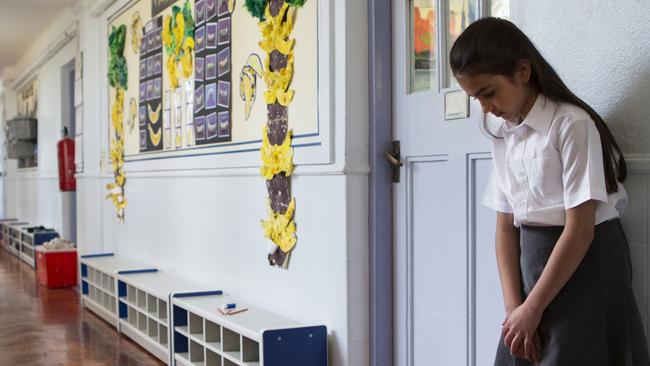
Sarah acknowledges there are tougher schools than hers. She has teacher friends working in the most disadvantaged public schools who are “barely surviving”.
“It’s like another world there. After a year they are seriously burnt out, ready to quit. One was not in a good place at all. It took moving to a school on the other side of town to improve her mental health dramatically,” she says.
Sheltered bureaucrats and politicians needed to spend more time in classrooms to discover the reality, Sarah says.
“Observations should be for a long period of time too, not just a fly-in, fly-out visit where students can be on their best behaviour.”
■ ■ ■
SOCIAL change including fewer stay- at-home parents has produced a “hidden epidemic” of adults who don’t take responsibility for their actions, according to the principal of a regional, highly disadvantaged public primary school.
And now that those adults have themselves become parents, schools have to deal with a generation of children who lack basic self-control.
“It would be nice to get back to the Three Rs but society has changed,” the principal says.
“Some of those kids are exposed to violence and aggressive language (at home) on a regular basis.
“It isn’t necessarily that the kids are naughty. They haven’t developed self-regulation and awareness.
“The challenge is a lot of kids haven’t been taught to manage their emotions. Emotional intelligence is something that needs to be explicitly taught to kids.
“Until they get that, all of the maths lessons and literacy lessons are neither here nor there. We can force some kids to comply but the learning won’t be meaningful.”
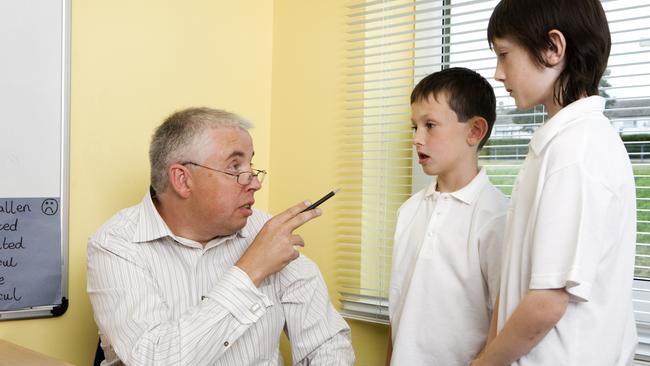
The school puts a high priority on exercises, both mental and physical, that help young children build awareness of their own bodies, the feelings that give rise to their frustrations, and communication and solving problems with their peers.
The principal says the toughest schools are quite well resourced for behavioural problems because of their high level of demand.
But many other schools would like more help, because even a small minority of troubled students can be highly disruptive.
“A lot of schools would like to see increased investment in social workers and counsellors. The current model is fairly skewed towards schools like ours,” he says.
“But I know of schools in the city that don’t necessarily have a high percentage of kids with challenging needs (that want more resources).
“It’s a challenge for the department to work out how best to allocate those resources.”
However, this principal is not hung up on the state’s NAPLAN results — he says the difference between SA and other states is statistically negligible. And he praises the current State Government for “letting go” of some things that have allowed schools to devote more time to the basics.
“We would always like more time, but it’s how we use that time that’s more important.”
The Education Department points to its investments in both behaviour and literacy and numeracy strategies.
“Our focus is on getting students to engage better in their learning, so they get the most from their schooling,” chief executive Rick Persse says.
“To achieve this we have also put significant resources into early intervention measures to help schools manage student behaviour”.
The numbers are impressive: $67.5 million for targeted literacy and numeracy support, 160 student wellbeing leaders in primary schools, 342 schools with pastoral care support, 60 “child wellbeing practitioners”, 30 behaviour coaches, and nine dedicated centres for students with severe behavioural problems.
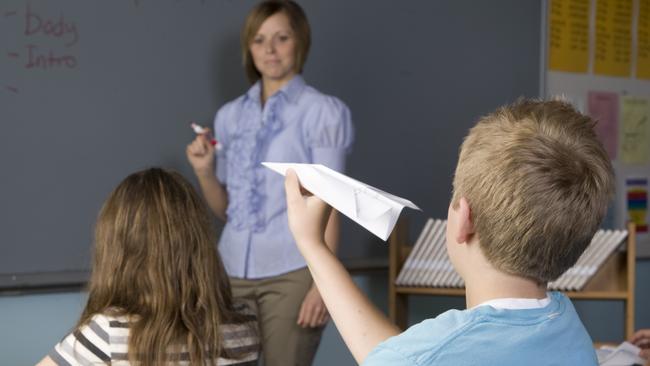
But when it was recently revealed that more than 925 students were suspended multiple times in a single term last year, principals called for more of the behaviour centres that currently have a combined capacity of 216 students.
The SA Secondary Principals Association said it was a “perennial concern” that the centres were often full by the end of Term 1. In the southern suburbs of Adelaide, an experienced public primary principal says the proportion of really difficult children in her school has thankfully fallen in recent years.
The school has had success embedding wellbeing strategies — particularly building children’s persistence, to reduce the frustration that can quickly turn to anger — within its teaching program.
It is now much rarer for students to swear at teachers, destroy teachers’ property, rip things off walls and turn over tables. But the principal is wary as that can change quickly.
“We could go along fine and then three or four (ward of the state) kids come along and suddenly the whole world’s different,” she says.
And while experienced leaders can change school cultures, she says tough schools often have inexperienced leaders “who think that they have to put up with stuff that they don’t have to”.
“If people are dealing with that every day, compassion fatigue and stress are huge,” she says. “What we don’t understand as a society is that kids have changed as well. It’s kids who don’t know how to build relationships with other kids, lots of kids with anger management issues.
“I don’t think their intention is to hurt a teacher. They are just really angry. An enraged, very small child can do a lot of damage. I’ve seen a five-year-old trash a classroom because they are so angry.
“And you get parents go in to bat for kids who have done extraordinarily the wrong thing, and (parents) can be quite aggressive as well.”
The principal says specific teacher training in behaviour management, especially for student teachers, should be a priority.
“If it was at the student teacher level and high quality training around behaviour and abuse-related trauma and autism, they would have that in their teacher’s toolbox before they started (their careers),” she says.
“It’s learning a huge toolkit of skills so these kids can learn and the kids around them can learn.”
SA Primary Principals Association president Pam Kent goes a step further. She says it should be mandatory for student teachers to do at least some of their work placements in highly disadvantaged and country schools.
“A lot of students coming out of university won’t have ever experienced those sorts of extreme behaviours,” she says. “You can’t really learn that stuff theoretically, you must experience it.
“For a lot of them it would be a culture shock.”
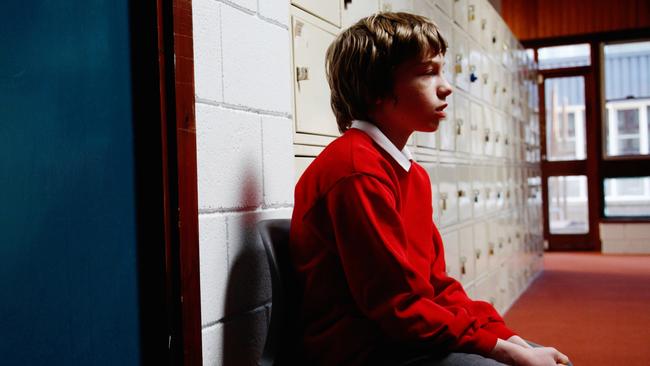
Ms Kent says student teachers should have a minimum 100 days practical classroom experience before graduating, up from the current 80 for undergraduates and 60 for masters students.
She does, however, acknowledge universities already have a hard time arranging enough school placements.
UniSA runs the biggest teacher training program in the state. Dean of Education Stephen Dobson says all UniSA teaching students already have to do a “managing the learning environment” course.
The course takes a wholistic view of behaviour management, looking at factors including how children interact with each other, family background and school support systems.
Prof Dobson says from next year, UniSA aims to offer all students the option of a regional placement, though not all regional schools are disadvantaged.
While not possible in every case, he says a “key wish” will be for students to have one of their four placements in a disadvantaged or regional school.
Catholic Education SA assistant director Mary Carmody says all Catholic schools encourage respectful relationships, positive communication and ways to “make and maintain friendships in a safe and supportive environment”.
She says schools use mental health and resilience programs among ways to improve student behaviour, while “professional learning and specific consultancy support” is available to staff in every Catholic school.
But for Melissa, it’s too late. “I’ll never go back,” she says.
*Names of teachers have been changed



